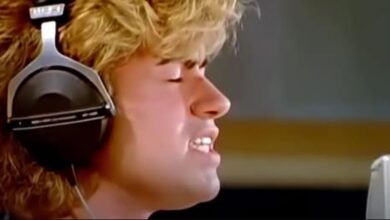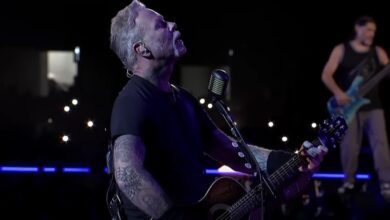1970 “Deep Purple” was 110% pure talent – simply amazing
Deep Purple’s performance of “Speed King” in 1970 is a quintessential example of the band’s powerful live shows during their early years. This track, featured on their fourth studio album “Deep Purple in Rock,” is often celebrated for its raw energy and instrumental prowess. The live rendition from 1970 showcases the band’s ability to deliver high-octane performances that captivated audiences and solidified their status as pioneers of hard rock and heavy metal.
“Speed King” opens with an explosive instrumental section, highlighting Ritchie Blackmore’s virtuosic guitar skills and Jon Lord’s distinctive organ playing. This introduction sets the stage for Ian Gillan’s dynamic vocals, which range from powerful screams to melodic verses. The song’s lyrics, while straightforward, capture the essence of rock and roll rebellion and youthful exuberance, themes that resonated deeply with fans of the era.
The live performance of “Speed King” in 1970 also features the tight rhythm section of Roger Glover on bass and Ian Paice on drums. Their synergy provides a solid foundation for the song’s fast tempo and complex arrangements. Paice’s drumming, in particular, stands out for its precision and intensity, driving the song forward and adding to its overall impact.
Deep Purple’s ability to perform such technically demanding music live is a testament to their musicianship. During the 1970 performance, the band members seamlessly transitioned between intricate solos and cohesive ensemble playing, demonstrating their skill and chemistry as a group. This live rendition of “Speed King” not only highlights individual talents but also the band’s collective power, making it a memorable part of their concert repertoire.
The energy and enthusiasm of the 1970 performance reflect the band’s commitment to pushing the boundaries of rock music. Deep Purple was at the forefront of the heavy metal movement, and their live shows were instrumental in defining the genre. “Speed King,” with its aggressive guitar riffs and driving rhythms, exemplifies the heavy, fast-paced sound that would influence countless bands in the years to come.
In addition to their musical abilities, Deep Purple’s stage presence played a significant role in their live performances. Ian Gillan’s commanding vocal delivery and charismatic stage persona engaged audiences, while Ritchie Blackmore’s flamboyant guitar antics added a visual spectacle to the auditory assault. This combination of visual and auditory elements made their concerts unforgettable experiences for fans.
The legacy of “Speed King” and Deep Purple’s live performances from this era continues to be celebrated by rock enthusiasts and musicians alike. The band’s influence is evident in the works of later rock and metal bands, who drew inspiration from their innovative sound and electrifying live shows. The 1970 performance of “Speed King” remains a defining moment in the history of rock music, capturing the essence of a band at the height of their creative powers.
Deep Purple’s impact on rock music extends beyond their live performances. Formed in 1968, the band quickly rose to fame with their blend of classical influences and hard rock. Over the years, they have undergone several lineup changes, but their commitment to musical excellence has remained constant. With hits like “Smoke on the Water” and “Highway Star,” Deep Purple has secured their place in the pantheon of rock legends.
In summary, the 1970 live performance of “Speed King” by Deep Purple is a powerful example of the band’s early prowess and enduring influence. Their ability to deliver such a high-energy and technically proficient show is a testament to their talent and dedication to their craft. This performance continues to be a celebrated piece of rock history, showcasing the best of what Deep Purple had to offer.





